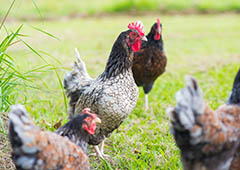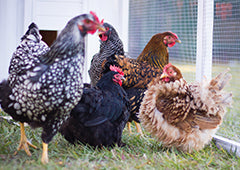With concerns steadily increasing about the current state and quality of our environment and the ongoing issue of climate change, many people are seeking to live a more sustainable lifestyle.
But what does sustainable living actually mean? Many people have heard of it, discussed it, and may even practice some elements of it, but are still confused by what it really is.
By keeping chickens you are contributing to living a sustainable lifestyle- go you! But what else does sustainable living entail?
What is Sustainable Living?
In short, sustainable living means practising a lifestyle that uses as few of Earth’s natural resources as possible, in an attempt to create the least amount of environmental damage for future generations.
Those who are committed to living a sustainable lifestyle will often try to reduce their carbon footprint by changing their means of transport, energy consumption and their diet- living in a way that is consistent with sustainability, and in balance with, and respectful of humanity’s symbiotic relationship with the Earth’s natural ecology and cycles.
Basically, sustainable living involves living on the Earth as lightly as possible- meeting one’s needs in the present without compromising the needs of future generations, so they too can enjoy the same high quality of life that people do today.
Why Should we Live Sustainably?
Sustainable living isn’t just a buzzword or a phase, it’s a continuing way of life, and one that is important if we are wanting to preserve the environment for our grandchildren and their grandchildren. If we continue to use all of our natural resources at the rate we are currently, and continue to cause ongoing damage to the environment from unsustainable practices, we are putting future generations in a situation where they will not have enough resources available to sustain life on earth.
How to Live Sustainably
Sustainable Energy
Those who choose to live a sustainable lifestyle will often rely on renewable energy sources- those that do not harm the environment, as a source of power. This can include water, solar, wind or geothermal energy.
There are also a number of small changes that can be made in regards to power consumption that will help make a home more energy efficient. Simple things such as changing to energy efficient light bulbs, adjusting temperatures by a few degrees, or simply turning it off, will all contribute to reducing your carbon footprint.
Sustainable Homes
Sustainable homes are built in a way that they use very few non-renewable resources and are run using the renewable energy sources noted above. Resources that are often used to build a sustainable house include; adobe, bamboo, composite wood, reclaimed stone or brick, recycled metal and concrete, wood and straw bale- all materials that have been produced in an environmentally friendly manner.
Sustainable Transportation Methods
The automobile industry is is not at all feasible to sustainable living, with carbon emissions and high energy prices contributing to our climates warming. Choosing small, fuel-efficient or hybrid cars, over gas guzzling four wheel drives, are a more sustainable choice for those wanting to contribute to this lifestyle. When possible, choosing public transport or walking or riding to your destination are even more environmentally friendly options.
Sustainable Food Choices
Making sustainable food choices includes choosing seasonal and locally grown food, as this reduces carbon footprint caused by long distance food transport, reduces the effects of pollution and will help to stimulate the local economy. It is also best to choose organic food where possible, to help minimise the risk of pollution to the environment caused by chemicals such as pesticides, or herbicides that are used on non-organic foods.
Many wanting to live a self-sustainable lifestyle will opt for a vegetarian lifestyle, as it causes less resources to produce, and causes the least amount of damage to the environment. Reducing meat consumption, and choosing to buy only organically raised, free range or grass-fed meat, is another alternative towards having a more sustainable diet.
Growing your own fruit and vegetables at home defines what it means to be truly self- sustainable- especially if they are also organic! Urban farming has surged in popularity recently, with communities banding together to help contribute to a self sustainable lifestyle- growing and trading their homegrown wares with one another, or contributing to public urban gardens.
Keeping backyard chickens is indispensable to sustainable living practices, providing fresh eggs to pair with your homegrown fruit and vegetables. Raising chickens is easy with the right setup and advice, all which can be found on The Backyard Chicken Coops website- chicken coops for every sized flock, and everything you wanted and needed to know about raising chickens!
Recycling & Reuse
Recycling plays a big role in living a sustainable lifestyle- reusing products to help minimise the addition of waste to landfill. Some materials that can be recycled include; glass, paper, plastic, metals and wood- these can also be up cycled which converts a material into something of similar or greater value in it’s second life.
Small adjustments to your lifestyle can also help to reduce waste- go electronic where possible to reduce paper waste, and turn food scraps into a compost. Before throwing things away, think about how they could possibly be reused- worn shirts can become cleaning cloths, empty glass jars make great tealight holders- simple, yet effective!
Although it has taken quite some time, people are starting to learn that environmental resources are not infinite, and so we need to do our best to preserve what we can, ensuring future generations can live harmoniously. It is our responsibility to contribute to this preservation by following sustainable living practices- every little bit counts.
As chicken keepers, we're already lovers of nature and the outdoors. Which is why the steps towards a more sustainable lifestyle comes naturally to us. From natural remedies to using seasonal foods for our chooks, you can be a super sustainable chicken parent. It's so important that we do an eggcellent job when caring for our feathered friends. There are so many things to consider when becoming a chicken parent from other pets to health issues. Many chicken keepers struggle to handle chicken health or behaviour issues, especially in the first few years of having a flock.
This is why I recommend Chickenpedia to all my readers. They have comprehensive online courses on everything you didn’t know you need to know and then some more! From healthcare to raising baby chicks to feeding and behavior, you’ll find beginner-friendly courses that’ll give you the knowledge and confidence to successfully look after your chickens.
As a member, you will get access to ALL their fantastic courses. No need to wing it, become the ultimate chicken eggspert! Check out Chickenpedia today!


















